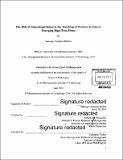The role of educational status in the matching of workers to jobs in emerging high-tech firms
Author(s)
Campero Molina, Santiago
DownloadFull printable version (8.060Mb)
Other Contributors
Sloan School of Management.
Advisor
Roberto M. Fernandez.
Terms of use
Metadata
Show full item recordAbstract
This dissertation contributes to our understanding of the economic and labor market advantages associated with having a prestigious educational background. In particular, I consider the role of educational status in the matching of technical workers to jobs in high-tech entrepreneurial firms. Distinctively among studies of the role of educational prestige in the firmworker matching process, I consider the supply and demand sides of the matching process separately. On the supply-side, I examine the relationship between the status of founders' educational backgrounds and their success in recruiting key technical workers. I find that firms whose founders had elite educational backgrounds display better candidate attraction outcomes. On the demand-side, I assess how the status of a candidate's educational background influences their ability to access technical jobs at high-tech entrepreneurial firms. Further, I provide insights into the role of various mechanisms behind the prestigious degree advantage in screening. In particular, I find that, in the initial steps of screening, the advantage enjoyed by candidates with elite backgrounds can be largely accounted for by their performance on a skills test. Also, I examine the potential for internships to mitigate the extent to which firms rely on prestigious educational credentials in screening. In contrast to arguments that suggest firms might be more willing to "take a risk" in screening for an internship, I find that firms favor elite candidates to a greater degree when screening for an internship than when doing so for a comparable full-time position.
Description
Thesis: Ph. D., Massachusetts Institute of Technology, Sloan School of Management, 2016. Cataloged from PDF version of thesis. Includes bibliographical references.
Date issued
2016Department
Sloan School of ManagementPublisher
Massachusetts Institute of Technology
Keywords
Sloan School of Management.